-
5 facts about U.S. Dairy's commitment to sustainability this World Milk Day
By USDEC May 31, 2021- Tweet
The theme for World Milk Day (June 1) is sustainability. U.S. dairy has a lot to be proud of and much work ahead to meet its net-zero by 2050 goal.
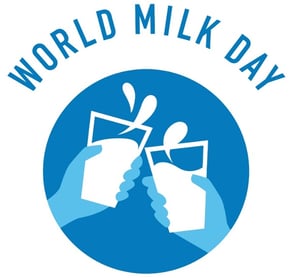
As we celebrate World Milk Day, U.S. Dairy continues to work ambitiously to be a sustainable solution for the planet and its people.
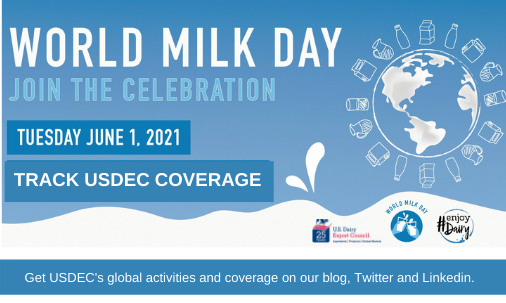
The following five facts back up that claim using data, charts, videos and more:
1. Dairy farmers are the original environmentalists.
For centuries, dairy farmers have taken good care of the land because the land is a source of nutrition for their cows. They use water responsibly and often recycle it to use on their crops or to clean their barns.
With advances in technology, dairy farmers have become adept at turning cow's manure into fertilizer for crops, converting methane into power for their farms and communities and recycling water for crop irrigation.
The following video goes into more detail on how dairy farmers are using "cow power" in a way that will help them achieve carbon neutrality by the year 2050.
2. The U.S. dairy industry has made tremendous progress in recent years cutting its “environmental footprint.”
Due to innovative practices in cow health, improved feed and genetic and modern management practices, the environmental impact of producing a gallon of milk in the United States shrunk significantly from 2007 to 2017, requiring 30% less water, 21 less land and a 19% smaller carbon footprint, according to a study published last year in the Journal of Animal Science.
An earlier study in the Journal of Animal Science found that the carbon footprint per unit of milk produced in the United States in 2007 was 63% less than it was in 1944.
Modern farming methods have made a big difference!
3. The U.S. dairy industry has set ambitious goals to become even more environmentally friendly.
In the United States, dairy’s greenhouse gas footprint is less than 2% of the nation’s total.
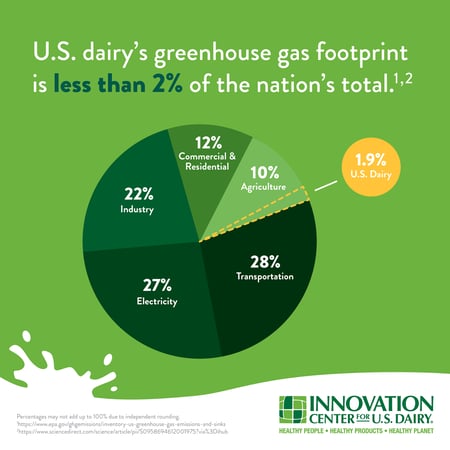
The industry wants to do better. That’s why it created The Net Zero Initiative to reach carbon neutrality by 2050.
NZI is an industry-wide effort to accelerate voluntary action on farm to reduce environmental impacts by making sustainable practices and technologies more accessible and affordable to U.S. dairy farms of all sizes and geographies.
Many of the practices and technologies needed to reach the industry’s goals largely exist but require further research and development and overall greater accessibility across farms of all sizes and geographies.
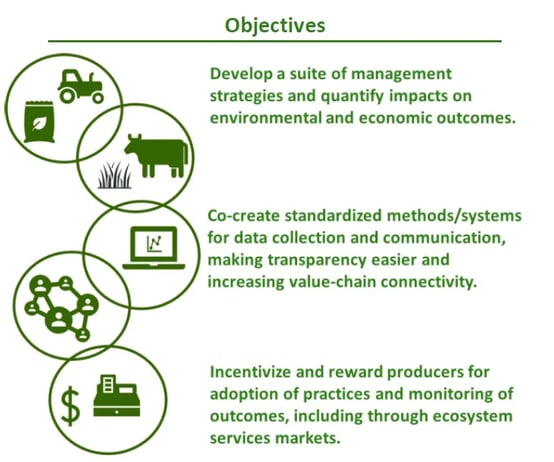
The U.S. dairy industry is creating partnerships to help it get where it wants to go.
In March, the Innovation Center for U.S. Dairy, Syngenta and The Nature Conservancy announced the creation of a new partnership that will help reduce greenhouse gas emissions by improving the production and efficiency of dairy cow feed.
Last October, Nestlé committed up to $10 million in a multi-year partnership to support the Net Zero Initiative. The resources will help scale access to environmental practices and resources on farms across the country.
Are these initiatives enough to move the needle on climate change? Yes.
A 2021 World Wildlife Fund analysis found that U.S. dairy farms could achieve net-zero emissions in as few as five years -- if the right incentives and supportive policies are put in place. The investment would mean a return of $1.9 million or more per farm.
If even 10% of dairy production in the U.S. were to achieve net-zero, GHG emissions could be reduced by more than 100 million tons.
Over time, continued commitment will positively affect climate change.
4. Dairy creates jobs and economic sustainability.
The International Dairy Foods Association’s Dairy Delivers℠ economic impact tool shows U.S. dairy is a coast-to-coast jobs machine. Dairy in this country supports more than 3 million jobs, generates $64 billion in tax revenue and contributes 3% of the country's gross domestic product (GDP), according to the IDFA study.
When a dairy farm spends money locally, it creates a multiplier effect. According to the Center for Dairy Excellence in Pennsylvania, for every $1 a dairy farm spends, roughly $2.50 in wages and related business transactions is contributed to the local economy.
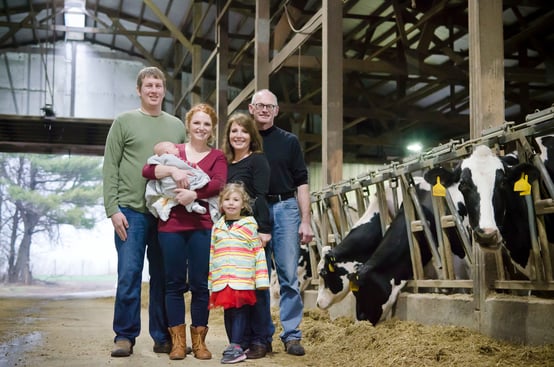
Globally, extensive research by the United Nations has determined that dairy farming reduces poverty.
Among the more than 900 million making less than $1 per day, most live in rural areas and depend on agriculture and livestock.
The Food and Agriculture Organization (FAO) of the United Nations, working with the Global Dairy Platform, researched the difference dairy farming makes in the lives of the world’s poorest people.
Their report, “Dairy Development’s Impact on Poverty Reduction,” concluded that: “Dairying not only contributes a regular source of food and income, but it puts farmers in a better position to feed their families, send their children to school, provide for their family’s health, and invest in their future.”
The report said, "Dairy has the power to provide a major pathway out of poverty for individuals, families, and communities by making the necessities of life— food, water, shelter and clothing – accessible and affordable."
Dairy farming gives hundreds of millions of people economic opportunities.
5. U.S. dairy farmers produce affordable, nutritious food in ways that are good for people and the planet.
Nutrient-rich dairy foods and beverages promote health and wellness across the globe.
The following video shows how the U.S. dairy industry is committed to producing those foods in a sustainable way -- on World Milk Day and all the days to come.
The world needs the sustainable nutrition that U.S. Dairy provides!
Learn more:
- Press kit from Dairy Management Inc.
-
Three reasons to applaud dairy on Earth Day
-
Net Zero Initiative builds momentum with new partnership featuring improved cow feed
-
Dairy’s sustainable past sets us up for a more sustainable future

Subscribe to the U.S. Dairy Exporter Blog
The U.S. Dairy Export Council fosters collaborative industry partnerships with processors, trading companies and others to enhance global demand for U.S. dairy products and ingredients. USDEC is primarily supported by Dairy Management Inc. through the dairy farmer checkoff. How to republish this post.
10 Most Recent Posts
Most Popular Posts in Past Year
Index of Posts by Topic
- #GotDairyJobs (4)
- About USDEC (67)
- Africa (6)
- Australia (4)
- Blog (8)
- Brazil (4)
- Canada (20)
- Central America (1)
- Cheese (58)
- Chile (1)
- China (54)
- Common food names (7)
- Company News (20)
- Consistent Supply (1)
- Crisis Management (3)
- Cuba (2)
- Dairy (6)
- Dairy checkoff (9)
- Dairy Ingredients (5)
- Dairy Management Inc. (2)
- Dairy Resources (1)
- Dairy Supply Chain (1)
- Dairy Trends (5)
- Documentation (3)
- EU (24)
- Experts on Dairy Exports (4)
- Exporter of the Year (2)
- Exports (24)
- Farmer leaders (1)
- Farming (38)
- Food Aid (8)
- Food Safety (8)
- Foodservice (3)
- Free trade agreements (34)
- Future trends (1)
- Geographical Indications (GIs) (10)
- Global Marketing (86)
- Global Shipping Crisis (1)
- Got Jobs? (9)
- Indonesia (1)
- Innovation (17)
- Japan (17)
- Krysta Harden (1)
- Market Access (25)
- Market Conditions (271)
- Member Services (17)
- Mexico (41)
- Middle East (9)
- Middle East & North Africa (3)
- Middle East/North Africa (9)
- Milk (4)
- Milk Protein Concentrate (MPC) (2)
- New Zealand (11)
- Next5% (20)
- Nonfat Dry Milk/Skim Milk Powder (8)
- Nutrition (19)
- Product Innovation (6)
- Protein (4)
- Regulations (5)
- Research & Data (329)
- Russia (3)
- Singapore (10)
- South America (8)
- South Korea (10)
- Southeast Asia (25)
- Strategic Insights (1)
- Supply (1)
- Sustainability (26)
- Technology (2)
- ThinkUSADairy (5)
- TPM23 (1)
- TPP (13)
- Traceability (8)
- Trade Barriers (5)
- Trade Data (7)
- Trade Policy (72)
- TTIP (5)
- UHT Milk (7)
- USMCA (2)
- Vietnam (4)
- Whey (6)
- Whey Ingredients (2)
- Whey products (10)
- Whole Milk Powder (WMP) (3)
- World Dairy Expo (1)
- World Milk Day (1)
- Yogurt (1)
Index of Posts by Date, Author
- June 2021 (13)
- March 2015 (12)
- September 2015 (12)
- April 2015 (11)
- December 2015 (11)
- March 2014 (10)
- February 2015 (10)
- October 2015 (10)
- October 2014 (9)
- June 2015 (9)
- July 2015 (9)
- November 2015 (9)
- March 2016 (9)
- October 2019 (9)
- September 2013 (8)
- May 2015 (8)
- August 2015 (8)
- January 2016 (8)
- February 2016 (8)
- March 2017 (8)
- December 2018 (8)
- May 2019 (8)
- December 2019 (8)
- June 2014 (7)
- November 2016 (7)
- May 2017 (7)
- May 2018 (7)
- July 2020 (7)
- June 2023 (7)
- July 2016 (6)
- August 2018 (6)
- October 2018 (6)
- November 2018 (6)
- February 2019 (6)
- June 2019 (6)
- August 2019 (6)
- March 2020 (6)
- April 2020 (6)
- June 2020 (6)
- June 2022 (6)
- February 2014 (5)
- June 2016 (5)
- August 2016 (5)
- September 2016 (5)
- December 2016 (5)
- February 2017 (5)
- July 2017 (5)
- October 2017 (5)
- January 2018 (5)
- April 2018 (5)
- June 2018 (5)
- July 2018 (5)
- September 2018 (5)
- January 2019 (5)
- March 2019 (5)
- April 2019 (5)
- July 2019 (5)
- September 2019 (5)
- November 2019 (5)
- January 2020 (5)
- August 2020 (5)
- October 2020 (5)
- April 2021 (5)
- January 2022 (5)
- May 2013 (4)
- September 2014 (4)
- April 2016 (4)
- May 2016 (4)
- October 2016 (4)
- January 2017 (4)
- April 2017 (4)
- June 2017 (4)
- August 2017 (4)
- September 2017 (4)
- December 2017 (4)
- February 2018 (4)
- February 2020 (4)
- May 2020 (4)
- February 2022 (4)
- September 2022 (4)
- April 2023 (4)
- December 2023 (4)
- November 2017 (3)
- March 2018 (3)
- September 2020 (3)
- December 2020 (3)
- February 2021 (3)
- May 2021 (3)
- August 2021 (3)
- December 2021 (3)
- March 2022 (3)
- April 2022 (3)
- May 2022 (3)
- October 2022 (3)
- December 2022 (3)
- May 2023 (3)
- July 2023 (3)
- November 2023 (3)
- January 2026 (3)
- March 2011 (2)
- June 2011 (2)
- September 2011 (2)
- March 2012 (2)
- June 2012 (2)
- July 2012 (2)
- March 2013 (2)
- July 2013 (2)
- November 2020 (2)
- January 2021 (2)
- March 2021 (2)
- July 2021 (2)
- September 2021 (2)
- October 2021 (2)
- November 2021 (2)
- July 2022 (2)
- August 2022 (2)
- January 2023 (2)
- March 2023 (2)
- October 2023 (2)
- January 2024 (2)
- February 2024 (2)
- April 2024 (2)
- June 2024 (2)
- July 2024 (2)
- November 2024 (2)
- December 2024 (2)
- February 2025 (2)
- June 2025 (2)
- July 2025 (2)
- September 2025 (2)
- November 2025 (2)
- December 2025 (2)
- January 2010 (1)
- February 2010 (1)
- March 2010 (1)
- April 2010 (1)
- May 2010 (1)
- June 2010 (1)
- July 2010 (1)
- August 2010 (1)
- September 2010 (1)
- October 2010 (1)
- November 2010 (1)
- December 2010 (1)
- January 2011 (1)
- February 2011 (1)
- April 2011 (1)
- May 2011 (1)
- July 2011 (1)
- August 2011 (1)
- October 2011 (1)
- November 2011 (1)
- December 2011 (1)
- January 2012 (1)
- February 2012 (1)
- April 2012 (1)
- August 2012 (1)
- September 2012 (1)
- October 2012 (1)
- November 2012 (1)
- December 2012 (1)
- January 2013 (1)
- February 2013 (1)
- April 2013 (1)
- June 2013 (1)
- August 2013 (1)
- October 2013 (1)
- November 2013 (1)
- December 2013 (1)
- January 2014 (1)
- April 2014 (1)
- May 2014 (1)
- November 2022 (1)
- February 2023 (1)
- August 2023 (1)
- September 2023 (1)
- March 2024 (1)
- May 2024 (1)
- August 2024 (1)
- September 2024 (1)
- October 2024 (1)
- January 2025 (1)
- March 2025 (1)
- April 2025 (1)
- May 2025 (1)
- August 2025 (1)
- February 2026 (1)
- USDEC (183)
- USDEC Staff (167)
- Alan Levitt (119)
- Tom Suber (41)
- Margaret Speich (22)
- Marc A.H. Beck (15)
- Vikki Nicholson-West (11)
- Angélique Hollister (11)
- Tom Vilsack (8)
- Jaime Castaneda (7)
- Matt McKnight (7)
- Véronique Lagrange (7)
- Margaret Speich and Mark O'Keefe (7)
- Ross Christieson (7)
- Paul Rogers (6)
- Shawna Morris (5)
- William Loux (5)
- Alan Levitt and Marc Beck (5)
- Krysta Harden (4)
- USDEC Communications (3)
- Kristi Saitama (3)
- Marilyn Hershey (3)
- Brad Gehrke (3)
- Tom Quaife (2)
- Nick Gardner (2)
- Jim Mulhern (2)
- Alan Levitt and William Loux (2)
- Kara McDonald (2)
- Luke Waring (2)
- Merle McNeil (2)
- Krysta Harden, USDEC President and CEO (2)
- Andrei Mikhalevsky (1)
- Rodrigo Fernandez (1)
- Dermot Carey (1)
- Jeremy Travis (1)
- Annie Bienvenue (1)
- Ross Christieson and Shawna Morris (1)
- Becky Nyman (1)
- Paul Rogers and Tom Quaife (1)
- Rick Ortman (1)
- Tony Rice (1)
- Barbara O’Brien (1)
- Paul Rogers and Mark O'Keefe (1)
- Dalilah Ghazalay (1)
- Amy Wagner (1)
- Mitchell Bowling (1)
- Erica Louder (1)
- Brad Scott (1)
- Amy Foor (1)
- Scott Lantz (1)
- Sandra Benson (1)
- Errico Auricchio (1)
- Jaclyn Krymowski (1)
.png)

